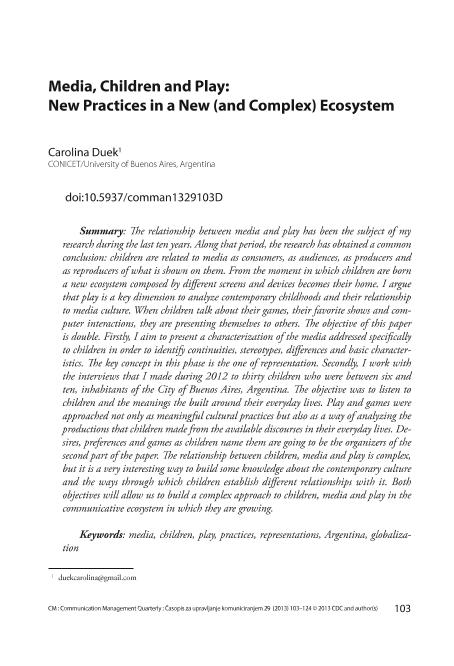Mostrar el registro sencillo del ítem
dc.contributor.author
Duek, Sara Carolina

dc.date.available
2018-01-19T15:27:34Z
dc.date.issued
2014-01
dc.identifier.citation
Duek, Sara Carolina; Media, Children and Play: New Practices in a New (and Complex) Ecosystem; University of Belgrade. Faculty of Political Sciences; Communication Management Quarterly; 85; 29; 1-2014; 103-124
dc.identifier.issn
1452-7405
dc.identifier.uri
http://hdl.handle.net/11336/33956
dc.description.abstract
The relationship between media and play has been the subject of my research during the last ten years. Along that period, the research has obtained a common conclusion: children are related to media as consumers, as audiences, as producers and as reproducers of what is shown on them. From the moment in which children are born a new ecosystem composed by different screens and devices becomes their home. I argue that play is a key dimension to analyze contemporary childhoods and their relationship to media culture. When children talk about their games, their favorite shows and computer interactions, they are presenting themselves to others. The objective of this paper is double. Firstly, I aim to present a characterization of the media addressed specifically to children in order to identify continuities, stereotypes, differences and basic characteristics. The key concept in this phase is the one of representation. Secondly, I work with the interviews that I made during 2012 to thirty children who were between six and ten, inhabitants of the City of Buenos Aires, Argentina. The objective was to listen to children and the meanings the built around their everyday lives. Play and games were approached not only as meaningful cultural practices but also as a way of analyzing the productions that children made from the available discourses in their everyday lives. Desires, preferences and games as children name them are going to be the organizers of the second part of the paper. The relationship between children, media and play is complex, but it is a very interesting way to build some knowledge about the contemporary culture and the ways through which children establish different relationships with it. Both objectives will allow us to build a complex approach to children, media and play in the communicative ecosystem in which they are growing.
dc.format
application/pdf
dc.language.iso
eng
dc.publisher
University of Belgrade. Faculty of Political Sciences
dc.rights
info:eu-repo/semantics/openAccess
dc.rights.uri
https://creativecommons.org/licenses/by-nc-sa/2.5/ar/
dc.subject
Play
dc.subject
Media
dc.subject
Children
dc.subject
Ecosystem
dc.subject
Practices
dc.subject
Argentina
dc.subject
Globalization
dc.subject.classification
Periodismo

dc.subject.classification
Comunicación y Medios

dc.subject.classification
CIENCIAS SOCIALES

dc.title
Media, Children and Play: New Practices in a New (and Complex) Ecosystem
dc.type
info:eu-repo/semantics/article
dc.type
info:ar-repo/semantics/artículo
dc.type
info:eu-repo/semantics/publishedVersion
dc.date.updated
2018-01-18T21:40:40Z
dc.journal.volume
85
dc.journal.number
29
dc.journal.pagination
103-124
dc.journal.pais
Serbia

dc.journal.ciudad
Novi Sad
dc.description.fil
Fil: Duek, Sara Carolina. Consejo Nacional de Investigaciones Científicas y Técnicas; Argentina. Universidad de Buenos Aires; Argentina
dc.journal.title
Communication Management Quarterly
dc.relation.alternativeid
info:eu-repo/semantics/altIdentifier/doi/http://dx.doi.org/10.5937/comman1329103D
dc.relation.alternativeid
info:eu-repo/semantics/altIdentifier/url/http://scindeks.ceon.rs/Article.aspx?artid=1452-74051329103D
Archivos asociados
